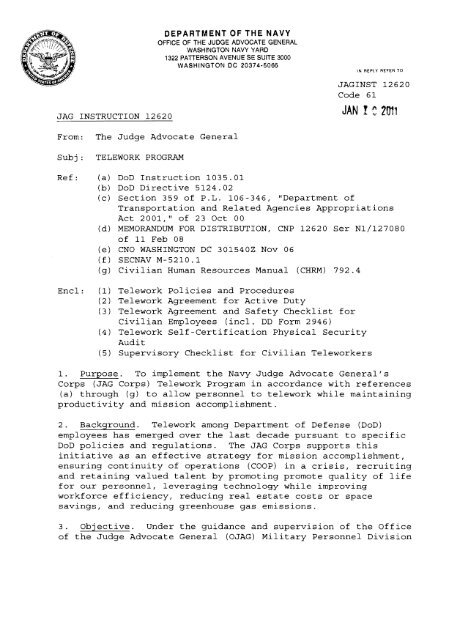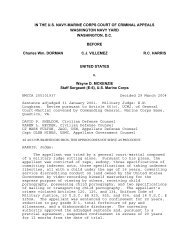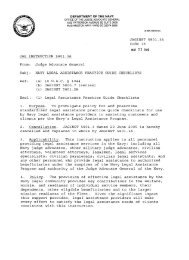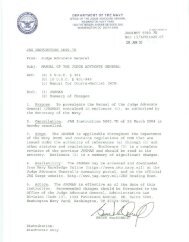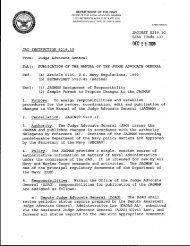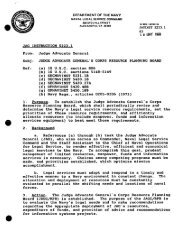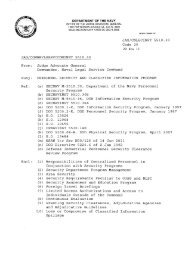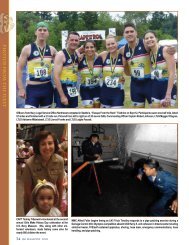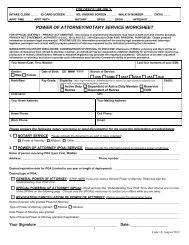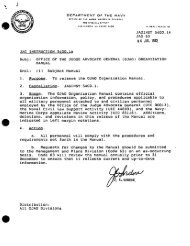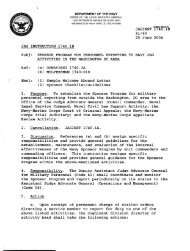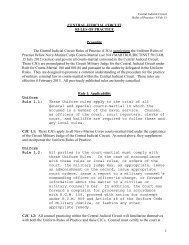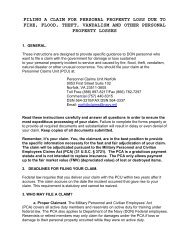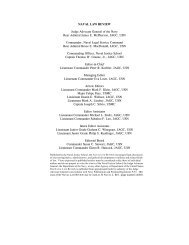2011 From - U.S. Navy Judge Advocate General's Corps
2011 From - U.S. Navy Judge Advocate General's Corps
2011 From - U.S. Navy Judge Advocate General's Corps
Create successful ePaper yourself
Turn your PDF publications into a flip-book with our unique Google optimized e-Paper software.
DEPARTMENT OF THE NAVY<br />
OFFICE OF THE JUDGE ADVOCATE GENERAL<br />
WASHINGTON NAVY YARD<br />
1322 PATIERSON AVENUE SE SUITE 3000<br />
WASHINGTON DC 20374-5066<br />
IN REPLY REFER TO<br />
JAGINST 12620<br />
Code 61<br />
JAG INSTRUCTION 12620<br />
JAN ! ~ <strong>2011</strong><br />
<strong>From</strong>:<br />
Subj:<br />
Ref:<br />
Encl:<br />
The <strong>Judge</strong> <strong>Advocate</strong> General<br />
TELEWORK PROGRAM<br />
(a) DoD Instruction 1035.01<br />
(b) DoD Directive 5124.02<br />
(c) Section 359 of P.L. 106-346, "Department of<br />
Transportation and Related Agencies Appropriations<br />
Act 2001," of 23 Oct 00<br />
(d) MEMORANDUM FOR DISTRIBUTION, CNP 12620 Ser N1/127080<br />
of 11 Feb 08<br />
(e) CNO WASHINGTON DC 301540Z Nov 06<br />
(f) SECNAV M-5210.1<br />
(g) Civilian Human Resources Manual (CHRM) 792.4<br />
( 1) Telework<br />
( 2) Telework<br />
( 3) Telework<br />
Civilian<br />
( 4) Telework<br />
Audit<br />
Policies and Procedures<br />
Agreement for Active Duty<br />
Agreement and Safety Checklist for<br />
Employees (incl. DD Form 2946)<br />
Self Certification Physical Security<br />
(5) Supervisory Checklist for Civilian Teleworkers<br />
1. Purpose. To implement the <strong>Navy</strong> <strong>Judge</strong> <strong>Advocate</strong> <strong>General's</strong><br />
<strong>Corps</strong> (JAG <strong>Corps</strong>) Telework Program in accordance with references<br />
(a) through (g) to allow personnel to telework while maintaining<br />
productivity and mission accomplishment.<br />
2. Background. Telework among Department of Defense (DoD)<br />
employees has emerged over the last decade pursuant to specific<br />
DoD polic and regulations. The JAG <strong>Corps</strong> supports this<br />
ini.tiat as an ef i ve strategy for mission accomplishment,<br />
ensuring continuity of operations (COOP) in a crisis, recruiting<br />
and retaining valued talent by promoting promote quality of life<br />
for our personnel, leveraging technology while improving<br />
workforce efficiency, reducing real estate costs or space<br />
savings, and reducing greenhouse gas emissions.<br />
3. Objective. Under the guidance and supervision of the Office<br />
of the <strong>Judge</strong> <strong>Advocate</strong> General (OJAG) Military Personnel Division
JAGINST 12620<br />
JAN l f: <strong>2011</strong><br />
(Code 61), this program is designed to promote telework as a<br />
legitimate method to meet mission requirements. The objectives<br />
of this program are to promote the JAG <strong>Corps</strong> Legal Community as<br />
an employer of choice and improve the recruitment and retention<br />
of high-quality personnel, while maintaining or increasing<br />
productivity and ensuring COOP.<br />
4. Policy. Telework is defined as a voluntary arrangement<br />
where a member performs official assigned duties at an alternate<br />
worksite on a regular and recurring basis or on a situational<br />
basis. The policy of the JAG <strong>Corps</strong>' formal Telework Program is<br />
as follows:<br />
a. The JAG <strong>Corps</strong> Telework Program is voluntary for eligible<br />
personnel. Personnel shall be selected to participate in the<br />
program based upon guidance and criteria set forth in enclosure<br />
( 1)<br />
b. Telework is discretionary workplace flexibility.<br />
Although use of telework is encouraged, civilian employees<br />
cannot be ordered to telework, unless the employee's dut s are<br />
designated as mission-critical or the employee's telework<br />
agreement addresses this requirement. Telework is not an<br />
entitlement and not all employees are eligible to telework.<br />
c. OJAG Division Directors and Naval Legal Service Command<br />
(NLSC) Commanding Officers may require teleworkers to report to<br />
their traditional worksite on scheduled telework days, based<br />
upon operational requirements. Division Directors and<br />
Commanding Officers may also end a teleworker's participation in<br />
the program should the teleworker's performance not meet<br />
prescribed standards, or if the teleworker's continued<br />
participation fails to benefit organizational needs.<br />
d. All active duty service members<br />
must sign a Telework Agreement for Act<br />
prior to beginning to telecommute.<br />
approved to telework<br />
Duty at enclosure (2)<br />
e. Enclosure (3) is DD Form 2946, DoD Telework Agreement.<br />
All civilian employees approved to telework, whether on a<br />
regular, recurring, or situational basis, must sign a Telework<br />
Agreement and Safety Checklist for Civilians at enclosure (3)<br />
prior to beginning to telework. Supervisors of civilian<br />
teleworkers must maintain a copy of the signed Telework<br />
Agreement and Safety Checklist for Civilians locally. Civilian<br />
employees with mission-critical duties and those who may be<br />
required to telework in the case of a COOP event, office closure<br />
2
JAGINST 12620<br />
JAN<br />
1 ,,, <strong>2011</strong><br />
• ' j \. . ''<br />
due to adverse or inclement weather, or pandemic health crisis<br />
must have enclosure (3) on file with their supervisor. Telework<br />
agreements shall be reviewed by the supervisor and teleworker,<br />
re-validated at least every 2 years, and revised when<br />
appropriate. A new DD Form 2946 should be completed when a new<br />
relationship is established between the employee and their<br />
supervisor (e.g. change of supervisor).<br />
f. All personnel approved for telework, active duty or<br />
civilian, must complete a Physical Security Audit at enclosure<br />
(4) prior to beginning the Telework Program. Supervisors of<br />
civilian teleworkers must maintain a copy of the signed Physical<br />
Security Audit locally.<br />
g. Supervisors of civilian personnel approved for telework<br />
must complete the Supervisory Checklist at enclosure (5) before<br />
the civilian employee may begin telework. Supervisors of<br />
civilian teleworkers must maintain a copy of the signed<br />
Supervisory Checklist locally.<br />
h. At the discretion of the Division Director or Commanding<br />
Officer, active duty service members can telework outside the<br />
geographical limits of their permanent duty station as long as<br />
there is recall capability within 24 hours. Travel between the<br />
alternate work site and permanent duty station does not create<br />
an entitlement to reimbursement of travel expenses, and all<br />
travel will be conducted pursuant to normal liberty guidelines.<br />
i. Employees or Service members who perform missioncritical<br />
dut s may be required to work from home or an<br />
alternate workplace such as a telework center during an<br />
emergency situation. Employees or Service members designated as<br />
mission-critical should telework on a regular basis to ensure<br />
their proficiency and telework 1<br />
s effectiveness in continuing<br />
operations in the event of an emergency or pandemic. Missioncritical<br />
employees in positions not typically eligible for<br />
telework should telework on a situational basis, when feasible/<br />
order to test and exercise telework for COOP situations.<br />
Such civilian employees should have a signed DD Form 2946<br />
(enclosure (3)) in place. Telework agreements are not required<br />
for Service members.<br />
5. Performance Management. Evaluation criteria for work<br />
performance will remain the same. Work performance will be<br />
evaluated based on individual performance as measured against<br />
established standards/ performance measurements, and performance<br />
expectations of the position.<br />
3
JAGINST 12620<br />
JAN 1 0 <strong>2011</strong><br />
6. Equipment/Telecommunications. To participate in the<br />
Telework Program, service members and civilian employees must<br />
equip their home work stations adequately to maintain their<br />
productivity. This may require a personal computer, telephone,<br />
and connectivity for voice and data. Teleworkers are<br />
responsible for maintenance and repair of their personal<br />
computers, telephones, and voice and data connections. The<br />
telecommuter's command will provide Common Access Card (CAC)<br />
readers and related software necessary to access <strong>Navy</strong> and Marine<br />
<strong>Corps</strong> Intranet (NMCI) e-mail accounts. Upon termination of the<br />
Telework Program, teleworkers must return all Government<br />
property to their supervisor. Personal computers must be CAC<br />
enabled and downloaded with free NMCI virus protection software.<br />
All sensitive information shall require a NMCI laptop.<br />
7. Expenses. The JAG <strong>Corps</strong> will only reimburse full-time<br />
telework members for routine expenses associated with telework,<br />
such as office furniture or office supplies. Part-time<br />
teleworkers should organize their work so that office supplies<br />
are used when they are in the office. Upon a teleworker's<br />
request and with the Division Director's or Commanding Officer's<br />
approval, the JAG <strong>Corps</strong> may supply long distance calling cards<br />
to cover teleworkers' official long distance telephone calls.<br />
8. Information Assurance. Teleworkers agree to adhere to DoD<br />
and NMCI Information Assurance policies and guidelines, and to<br />
ensure that communication equipment is functional. If<br />
teleworkers experience any technical problems, they will notify<br />
their supervisor immediately and contact the appropriate service<br />
provider. Consistent with the policies identified above,<br />
teleworkers may not take any classified materials (hard copy or<br />
electronic) to alternate works All materials and property<br />
provided by the Department of the <strong>Navy</strong> (DON) are for authorized<br />
business use only. Security and care of Government-supplied<br />
property and information are the teleworker's responsibility.<br />
The teleworker will follow all DON, <strong>Navy</strong> Net Warfare Command,<br />
and JAG <strong>Corps</strong> policies, procedures, and directives to protect<br />
all information, with a specific emphasis on protecting Privacy<br />
Act and Personally Identifiable Information in the telework<br />
environment. Should Government equipment be lost, stolen, or<br />
damaged, teleworkers must report the incident to their<br />
supervisor immediately. Should Privacy Act or Personally<br />
Identifiable Information data be lost or compromised,<br />
teleworkers must report the incident immediately to their<br />
supervisor and Information Assurance Manager and follow<br />
procedures set forth in reference (e) . Upon termination of the<br />
4
Telework Program, teleworkers must return all Government<br />
property to their supervisor.<br />
JAGINST 12620<br />
JAN I 0 <strong>2011</strong><br />
9. Guidance and Requirements for Civilians. Civilian employee<br />
participation in the Telework Program must comply with<br />
references (a) and (f) guidance and requirements for civilian<br />
telework. The OJAG Civilian Personnel Manager (Code 64) will be<br />
responsible for ensuring JAG <strong>Corps</strong> Telework Program guidance and<br />
requirements comply with DON Office of Civilian Human Resources<br />
(OCHR) guidance and requirements. Requirements for civilians<br />
may include, but not be limited to, a civilian-specific Telework<br />
Agreement and a Safety Checklist for home work stations, and<br />
they are subject to change.<br />
10. Coordination.<br />
61) is the point of<br />
Telework Program.<br />
The OJAG Military Personnel Division (Code<br />
contact for all matters relating to the<br />
11. Records Management. Records created by this instruction,<br />
regardless of media, will be managed in accordance with<br />
reference (f) .<br />
Distribution:<br />
Electronic only via the OJAG website, www.jag.navy.mil, and the<br />
<strong>Navy</strong> Directives Web site, http://doni.daps.dla.mil.<br />
5
Telework Policies and Procedures<br />
JAGINST 12620<br />
JAN 1 {) <strong>2011</strong><br />
1. Program Objectives. The main goals of this program are to<br />
improve the quality of life of our personnel and the recruitment<br />
and retention of high quality personnel, while maintaining or<br />
increasing productivity and ensuring COOP. The flexibility<br />
telework provides will improve participants' quality of life,<br />
mental health, and morale. With the prior approval of the<br />
supervisor, service members and civilian employees may work non<br />
traditional hours during telework days in order to participate<br />
in non-work related activit during the workday.<br />
2. Behaviors to Avoid. Challenges of a telework program<br />
include:<br />
a. Perception of "t ework day" as a "day off";<br />
b. Decreased morale due to perceived unfairness in the<br />
selection process;<br />
c. Decreased morale for non-participants due to a belief<br />
that participants are not working as hard; and<br />
d. Perception of the program as an entitlement and<br />
decreased morale if the program is discontinued.<br />
3. Scope<br />
a. Program cycle. Participation in the Telework Program<br />
will occur in six-month cycles. At the end of each cycle,<br />
supervisors will review each telecommuter's productivity and<br />
determine whether another six-month assignment to the program is<br />
appropriate. The supervisor may terminate participation in the<br />
program at any time if the teleworker fails to meet productivity<br />
requirements, or the supervisor determines that the teleworker's<br />
participation in the program is no longer beneficial to the work<br />
center.<br />
b. The nature of most duties in the JAG <strong>Corps</strong> requires that<br />
offices maintain a staff on site that is adequate to respond to<br />
customers and unforeseen requirements. In order to ensure<br />
sufficient personnel on site and to maximize the opportunity for<br />
all employees to share in the benefits of telework, supervisors<br />
will generally approve telework requests of only up to two days<br />
per week. However, the Assistant <strong>Judge</strong> <strong>Advocate</strong> Generals, and<br />
the Deputy Commanders for Region Legal Service Off and Naval<br />
Enclosure (1)
JAGINST 12620<br />
JAN 1 0 201,<br />
Legal Service Offices, have the authority to approve requests to<br />
telework more than two days per week.<br />
c. Telework can be done on an ad hoc basis; however,<br />
scheduled telework days are strongly preferred as they provide a<br />
structure for participants, co-workers, and the chain of<br />
command.<br />
d. Telework may include time to complete approved<br />
professional training or coursework for an approved professional<br />
education program.<br />
4. Participants<br />
a. This program is available to military service members<br />
and civilian personnel. Civilian participants will also be<br />
subject to telework requirements, policies, and procedures<br />
promulgated by the Office of Personnel Management and the DON<br />
Civilian Human Resources.<br />
b. Suitability of Work<br />
(1) Supervisors should determine whether a position is<br />
suitable for telework by focusing on the nature of the work and<br />
job characteristics. Generally, positions with a history of<br />
productivity data or positions that involve tasks that would<br />
benefit from an offsite day should be the focus of the program.<br />
In many cases, 100 percent of a position will not lend itself to<br />
telework. However, there may be discrete job tasks that can be<br />
identified for telework days and can be performed away from the<br />
main office.<br />
(2) For example, telework is feasible for work that<br />
requires thinking and writing - data analysis, reviewing cases,<br />
drafting documents or reports; telephone-intensive tasks<br />
setting up a conference, obtaining information, following up on<br />
information; and computer-oriented tasks -- programming, web<br />
page design, data entry, and word processing.<br />
(3) Telework may not be appropriate if the service<br />
member or civilian employee needs to have extensive face to-face<br />
contact with the supervisor, other service members, clients, or<br />
the general public. Telework may not be feasible for positions<br />
that require frequent access to material that cannot be moved<br />
from the regular office.<br />
2 Enclosure (1)
c. Suitability of Service Member or Civilian Employee<br />
JAGINST 12620<br />
JAN l 0 2m1<br />
(1) Service members and civilian employees at every<br />
level of the chain of command are eligible to participate in the<br />
program. As a general rule, a service member or civilian<br />
employee should be onboard the command for at least six months<br />
before participating in the Telework Program, unless<br />
specifically authorized by the supervising Assistant <strong>Judge</strong><br />
<strong>Advocate</strong> General or Commanding Officer. This period provides<br />
workplace supervisors time to evaluate whether the service<br />
member or civilian employee is right for the program.<br />
(2) The characteristics of a service member or civilian<br />
employee are particularly important in determining participation<br />
in the program. The service member or civilian employee should<br />
be an organized, highly disciplined, and conscientious selfstarter<br />
who requires minimal supervision and has excellent time<br />
management skills. A service member's performance should be at<br />
least above average. A civilian employee's performance should<br />
meet all the performance expectations of the position.<br />
Employees whose performance or conduct warrants more close<br />
supervisory direction than telework may provide are generally<br />
not suitable for telework. In certain situations; however, a<br />
supervisor may choose to offer telework as a way to help the<br />
service member or civilian employee improve performance.<br />
Telework eliminates long commute times and provides flexibility<br />
for those who struggle with personal responsibilities<br />
interfering with their normal workday. For example, telework<br />
may assist a service member or civilian employee who must leave<br />
work frequently to attend medical appointments for a child or<br />
family member. Telework improves productivity for a parent who<br />
must stay home when a child is sick. Of course telework should<br />
not be a substitute for child care. Regardless of the<br />
situation, the service member or civilian employee must be<br />
trustworthy.<br />
(3) Telework is not suitable for service members or<br />
civilian employees who need to be in the office to learn about<br />
the organization, who require on-the job training, who need<br />
close supervision, or who thrive on interaction with co-workers<br />
and would suffer from the isolation of working alone.<br />
(4) The characteristics of the supervisor are also<br />
critical. The supervisor should be willing to try out the new<br />
arrangement and take the necessary steps to ensure its success.<br />
Most importantly, in a telework environment, the supervisor<br />
3 Enclosure (1)
JAGINST 12620<br />
JAN I
"Total Force" section of the JAG <strong>Corps</strong> <strong>Navy</strong> Knowledge Online<br />
website.<br />
JAGINST 12620<br />
JAN I 0 <strong>2011</strong><br />
8. Equipment/Expenses. To participate in the Telework Program/<br />
service members and civilian employees must equip their home<br />
work stations adequately to maintain their productivity. This<br />
may require a personal computer/ telephone/ and .connect ty for<br />
voice and data. Teleworkers are responsible for maintenance and<br />
repair of their personal computers/ telephones/ and voice and<br />
data connections. The JAG <strong>Corps</strong> assumes no responsibility for<br />
the service member 1<br />
S or civilian employee/s telework-related<br />
expenses/ with the following exceptions:<br />
a. The teleworker 1 S command will provide CAC readers and<br />
related software necessary to access NMCI e-mail accounts.<br />
b. Upon a teleworker 1 S request and with the Division<br />
Director 1 S or Commanding Officer/s approval/ the JAG <strong>Corps</strong> may<br />
supply long distance calling cards to cover the cost of official<br />
long distance telephone ls made from the telecommuter 1 s home.<br />
Teleworkers who request JAG <strong>Corps</strong> funded long distance calling<br />
cards must demonstrate the necessity of the cards and must abide<br />
by policies to prevent private misuse of the calling cards.<br />
9. Civilian Personnel Policies Procedures<br />
a. Official Duty Station. A teleworker 1 S official duty<br />
station continues to be the main duty station, not the<br />
alternative workplace. Periodic presence at the official duty<br />
station will minimize isolation and communication problems; give<br />
the teleworker access to equipment/ services/ etc. 1<br />
not<br />
available at the alternate workplace; facilitate integration of<br />
the employee with those in the main office; and ease supervisory<br />
adjustment to the new work arrangement.<br />
b. Hours of Duty. Existing rules for hours of duty apply<br />
to telecommuters. Supervisors determine employee work schedules<br />
consistent with the requirements of the work group and<br />
provisions of any applicable collective bargaining agreements.<br />
The Division Director or Commanding Officer 1 or their designee/<br />
may approve alternative work schedules for telecommuters.<br />
Teleworkers will be accessible to their on-site counterparts<br />
during their agreed upon regular business hours 1<br />
despite work<br />
location.<br />
c. Pay and Leave. Existing rules on pay and leave apply to<br />
t eworkers. The location of an employee's work site has no<br />
5 Enclosure (1)
impact on these rules.<br />
schedule.<br />
JAGINST 12620<br />
JAN 1 n 201'<br />
Pay and leave rules depend on the work<br />
d. Overtime. The existing rules on overtime under tle V,<br />
U.S. Code and the Fair Labor Standards Act (FLSA) apply to<br />
teleworkers. Supervisors should make sure that employees work<br />
overtime only with advance approval and should cancel<br />
telecommuting privileges of employees who continue to work<br />
unapproved overtime.<br />
e. Certification and Control of Time and Attendance.<br />
Supervisors must report time and attendance to ensure that<br />
teleworkers are paid only for the work performed and that<br />
absences from scheduled tours of duty are accounted for. The<br />
General Accounting Office {GAO) requires agencies with employees<br />
working at remote sites provide reasonable assurance that the<br />
employees are working when scheduled, example, by<br />
determining the reasonableness of the work output for the time<br />
spent or by having the supervisor make occasional t ephone<br />
calls during the employee's scheduled work time. The supervisor<br />
will determine the reasonableness of the work output for the<br />
time spent.<br />
f. Supervisors will ensure that the teleworker's<br />
work site meets acceptable standards. If the employee's home is<br />
the telework location, it is the responsibility of the employee<br />
to make certain that a safe work environment is maintained while<br />
teleworking. Employees should designate one section of the home<br />
as the telework work station for purposes of the telework<br />
agreement. Civilian employees working at home must complete a<br />
self-certification safety inspection form {included in enclosure<br />
(3) of this instruction).<br />
g. Worker's Compensation. Employees are covered by Chapter<br />
81 of title 5, United States Code (also known as "The Federal<br />
Employment Compensation Act") when injured or suffering from<br />
work-related illnesses while conducting official Government<br />
business at the telework location. The DoD's potential exposure<br />
to liability is restricted to the designated official alternate<br />
worksite. Supervisors are to be notified immediately if injury<br />
or illness occurs.<br />
h. Emergency Situations<br />
(1) Employees who perform mission-critical duties may be<br />
required to work from home or an alternate workplace such as a<br />
telework center during an emergency situation. Civilian<br />
6 Enclosure (1)
JAGINST 12620<br />
JAN l i: 10:~<br />
employees who perform mission-critical duties shall have a<br />
signed DD Form 2946 (enclosure (3)) in place. The telework<br />
agreement should address the telework location and work<br />
expectations. To the extent practicable, supervisors will<br />
include a description of emergency duties with the telework<br />
agreement if emergency duties are different from the employee's<br />
normal duties. In the event of a pandemic health crisis,<br />
employees with COOP responsibilities or Service members may be<br />
asked to telework to prevent the spread of germs. These<br />
employees or Service members should telework on a regular basis<br />
to ensure their proficiency and telework's effectiveness in<br />
continuing operations.<br />
(2) Employees approved for regular and situational<br />
telework who are not able to report to their assigned office<br />
location due to office closure or dismissal from a natural or<br />
man made emergency event (e.g., hurricane, earthquake, wild<br />
fire, snow storm, flooding, act of terrorism) shall continue to<br />
telework each regularly scheduled work day during the emergency<br />
situation. Designated employees who are unable to work due to<br />
injury or illness or dependent care responsibilities will<br />
request leave appropriate for those circumstances. If<br />
circumstances permitting excused absence for other nonteleworking<br />
employees also prevent the teleworker from working<br />
at the telework location (e.g., loss of electrical power;<br />
evacuation by local authorities; or the employee cannot access<br />
materials necessary to continue work during the emergency), the<br />
employee shall attempt to contact a supervisor to be excused<br />
from duty. Supervisors may administratively excuse the<br />
designated teleworker from teleworking on a case-by case basis.<br />
If the teleworker is unable to communicate with their immediate<br />
supervisor to be excused from duty and cannot maintain their<br />
remote working status, the teleworker will attempt to contact<br />
the next supervisor in his/her chain of command. Any<br />
requirement that a teleworker continue to work if the Component<br />
closes or dismisses employees early shall be included in the<br />
employee's DD Form 2946.<br />
(3) When an employee's residence or other approved<br />
alternate workplace has been designated as a safe haven during<br />
an emergency, such as a pandemic health crisis evacuation, the<br />
supervisor may assign any work necessary, as long as the<br />
employee has the skills to perform the assigned work, without<br />
regard to the employee's grade or pay band level. In cases<br />
where a safe haven is designated, a DD Form 2946 does not need<br />
to be in place.<br />
7 Enclosure (1)
(a)<br />
1. Performance Management. In accordance with reference<br />
(1) Performance standards for employees that telework<br />
shall be the same as performance standards for on-site<br />
employees.<br />
(2) As with any supervisory relationship/ work<br />
assignments to be performed or training to be accomplished while<br />
on telework should be agreed tor and understood/ in advance of<br />
the telework event.<br />
(3) Supervisor expectations of an employees/ performance<br />
should be clearly addressed in the DD Form 2946. As with on-site<br />
personnel/ employees shall be held accountable for the results<br />
they produce while teleworking.<br />
(4) Supervisors shall communicate expectations of<br />
telework arrangements/ including work assignments/ office<br />
coverage/ and staff communication to teleworking and nonteleworking<br />
employees in the workgroup. Supervisors shall put<br />
procedures in place to maintain communication across members of<br />
a workgroup. Supervisors are responsible for the effective<br />
functioning of the workgroup. However/ employees are<br />
responsible for their availability and information sharing with<br />
the workgroup/ and for ensuring the success of the telework<br />
arrangement.<br />
10. Proposals. Each OJAG Division or NLSC Command that<br />
participates in the program shall draft a Program Proposal for<br />
each applicant to the Telework Program. proposal shall name<br />
the nominated participant/ provide a br f explanation of his or<br />
her duties, set forth which job tasks lend themselves to<br />
telecommuting, confirm that no classified information is<br />
required for telecommuting, provide a proposal for how the<br />
participant's productivity shall be measured, and provide a<br />
proposed telework schedule. The Division Director or Department<br />
Head shall submit proposals to the appropriate Assistant <strong>Judge</strong><br />
<strong>Advocate</strong> General or Commanding Officer for approval. A copy of<br />
each approved proposal shall be maintained locally by the<br />
applicable command. A sample Program Proposal is included as<br />
Appendix {A) .<br />
11. Required Documents Upon Approval. After the appropriate<br />
Assistant <strong>Judge</strong> <strong>Advocate</strong> General or Commanding Officer approves<br />
an active duty service member's or civilian employee's<br />
8 Enclosure {1)
JAGINST 12620<br />
JAN 10 2tm<br />
participation in the Telework Program, the following documents<br />
must be completed:<br />
a. Active duty service members must complete the Telework<br />
Agreement at enclosure (2), and the Self-Certifying Physical<br />
Security Audit at enclosure (4). Supervisors will retain the<br />
originals locally.<br />
b. Civilian employees must complete the Telework Agreement<br />
and Safety Checklist at enclosure (3), and the Self Certifying<br />
Physical Security Audit at enclosure (4). Supervisors will<br />
retain the originals locally.<br />
c. Supervisors of civilian employees approved for telework<br />
must complete the Supervisory Checklist for Civilian Teleworkers<br />
at enclosure (5) for each civilian telework. Supervisors will<br />
retain the originals locally and provide a copy to the civilian<br />
telework.<br />
12. Cancellation. Upon their request, teleworkers may opt out<br />
of the Telework Program and resume working at their official<br />
workplace. Division Directors and Commanding Officers may also<br />
end a teleworker's participation in the program should the<br />
teleworker's performance not meet prescribed standards, or if<br />
the teleworker's continued participation fails to benefit<br />
organizational needs. Reasons for cancellation can include but<br />
are not limited to: decline in performance, participation fails<br />
to benefit organizational needs, the need for in-office<br />
interaction with co workers or customers arises, or other workrelated<br />
reasons. The teleworker and the supervisor must sign<br />
the original Telework Agreement to document termination of a<br />
telework arrangement.<br />
9 Enclosure (1)
Appendix A<br />
JAGINST 12620<br />
JAN 1 {j 201'1<br />
Sample Telework Program Proposal/Approval<br />
12620<br />
Serial<br />
Date<br />
<strong>From</strong>:<br />
To:<br />
Subj:<br />
Captain John Jones, JAGC, USN, Division Director, OJAG<br />
Code 45, Appellate Defense<br />
Colonel Jane Doe, USMC, Assistant <strong>Judge</strong> <strong>Advocate</strong> General<br />
(Military Justice)<br />
RECOMMENDATION FOR TELEWORK PARTICIPATION<br />
Ref: (a) JAGINST 12620<br />
1. Pursuant to reference {a), I recommend LT Joe Smith, JAGC,<br />
USN, for participation in the Telework Program.<br />
2. Explanation of Duties. LT Smith is an appellate defense<br />
counsel. He represents service members who have been convicted<br />
of crimes at courts-martial. LT Smith is responsible for<br />
explaining to clients the appellate process, as well as the<br />
range of potential outcomes, economic effects, timetables,<br />
effect of the judgment pending appeal, and the availability of<br />
alternative solutions. He is responsible for keeping clients<br />
informed and involved in decisions and promptly responding to<br />
inquiries. LT Smith spends much of his time reviewing records,<br />
drafting motions, and preparing for oral argument.<br />
3. Job tasks amenable to telework. Telephone and written<br />
correspondence; review of relevant case law; document review;<br />
motion drafting; oral argument preparation.<br />
4. Classified/Privacy Act/Personally Identifiable Information.<br />
LT Smith's work does not involve classified materi He will<br />
receive training on working with Privacy Act and Personally<br />
Identifiable Information if approved for this program.<br />
5. Measuring productivity. LT Smith and his co-workers carry<br />
approximately 20 appellate cases. LT Smith will be expected to<br />
maintain the same caseload and processing time, which will<br />
increase and decrease consistent with the division workloads.<br />
He will be expected to maintain his share of the work. LT Smith<br />
will also be required to enter CMTIS data for telework days.<br />
Although I expect that LT Smith will be more efficient while<br />
A-1<br />
Enclosure (1)
JAGINST 12620<br />
"'n.. ~~ '~..<br />
J •N tt ,.,1<br />
Jl\ ~i. ~ •) (_ I, ~<br />
working from home, I will monitor to ensure that LT Smith is<br />
working and complying with normal leave and liberty polic s.<br />
6. Proposed telecommuting schedule. LT Smith will telework two<br />
days per week. He is scheduled to telework on Mondays and<br />
Wednesdays but understands his telework days are subject to<br />
change given operational needs of the office.<br />
7. Training and supporting documents. Upon approval, LT Smith<br />
will complete required training and will submit the agreement<br />
and audit required to participate this program.<br />
ENDORSEMENT<br />
J. JONES<br />
Code/Serial<br />
Date<br />
<strong>From</strong>:<br />
Subj:<br />
Assistant <strong>Judge</strong> <strong>Advocate</strong> General (Military Justice)<br />
RECOMMENDATION FOR TELEWORK PARTICIPATION<br />
1. I hereby authorize LT Joe Smith, JAGC, USN, to participate<br />
in the Telework Program.<br />
J. DOE<br />
Copy to:<br />
1) Telework Program Coordinator<br />
2) Civilian Personnel Manager, Code 64 (for civilian applicants<br />
only)<br />
A-2<br />
Enclosure (1)
Telework Agreement for Active Duty<br />
JAGINST 12620<br />
JAN 1 U <strong>2011</strong><br />
Name and Position:<br />
Command/Code:<br />
Home and Cell Phone Numbers:<br />
Work Email Address:<br />
My official workplace is:<br />
My alternate workplace address is:<br />
Estimated Telework Start Date:<br />
-----------------------------------<br />
Estimated Telework End Date (6 months later)<br />
Work Schedule<br />
Loca<br />
ce)<br />
1. Voluntary Participation. I voluntarily agree to work at the<br />
alternate work site indicated above and agree to follow all<br />
applicable policies and procedures. I recognize this<br />
arrangement is not a right or an employee benefit, but an<br />
additional method by which to accomplish work. My supervisor<br />
may cancel my participation in this program at any time. I<br />
shall complete all assigned work according to procedures my<br />
supervisor sets forth.<br />
2. Orientation/Evaluation/Focus Groups. I agree to participate<br />
in a JAG <strong>Corps</strong> training session covering the legal and<br />
administrative requirements of the Telework Program.<br />
Additionally, I agree to participate in evaluating the<br />
Enclosure (2)
effectiveness of the Telework Program. This evaluation may<br />
include surveys, focus groups, CMTIS data entry, or other<br />
methods used to assess the effectiveness of the Telework<br />
Program.<br />
JAGINST 12620<br />
JAN 1 ~ <strong>2011</strong><br />
3. Security. I will comply with Department of Defense {DoD)<br />
security policies and protect all Government data and resources<br />
at the alternate work site. I will protect data, including<br />
Personally Identifying Information, from unauthorized disclosure<br />
and will comply with the requirements of the Privacy and Freedom<br />
of Information Acts. I agree that no classified materials {hard<br />
copy or electronic) will be either used or stored at my<br />
alternate workplace.<br />
4. Pay/Leave. All pay, leave, and travel entitlements are<br />
based on my official duty station or workplace. I agree to<br />
follow established fice procedures for requesting and<br />
obtaining approval of leave.<br />
5. Alternate Workplace Cost. I understand that the Government<br />
will not be responsible for any operating costs that are<br />
associated with my working at home, with the exception of<br />
approved funding of long distance telephone calls. I understand<br />
that if I am approved for a long distance calling card, I may be<br />
subject to separate and additional requirements. I also<br />
understand that I do not relinquish any entitlement to<br />
reimbursement for authorized expenses incurred while conducting<br />
business for the Government, as provided for by statute and<br />
regulation.<br />
6. Standards of Conduct. I understand the DoD standards of<br />
conduct continue to apply to me while I work at my alternate<br />
work site.<br />
7. Cancellation. Upon my request, I may opt out of the<br />
Telework Program and resume working at my official workplace.<br />
At any time, my supervisor may require me to resume working at<br />
my official workplace. Reasons for cancellation include but are<br />
not limited to: performance declines, my participation fails to<br />
benefit organizational needs, the need for in-office interaction<br />
with co-workers or customers arises, or other work-related<br />
reasons.<br />
2 Enclosure (2)
Teleworker's Signature and Date:<br />
JAGINST 12620<br />
JAN 1 o zon<br />
Supervisor's Signature and Date:<br />
AJAG or NLSC Commanding Officer Signature and Date:<br />
If Cancellation is Necessary<br />
Teleworker's Signature and Date Acknowledging Cancellation:<br />
Supervisor's Signature and Date Acknowledging Cancellation:<br />
Copy to:<br />
Telework Program Coordinator<br />
3 Enclosure (2)
TELEWORK AGREEMENT AND SAFETY CHECKLIST FOR CIVILIANS<br />
1. The following constitutes the terms and conditions of the<br />
telework agreement between:<br />
JAGINST 12620<br />
JAN 102m,<br />
Employee:<br />
Last Name First Name Middle Initial<br />
Title<br />
Pay Plan -<br />
Series-Grade<br />
OFFICE OF THE JUDGE ADVOCATE GENERAL<br />
Type of agreement: (Circle one): Regular and Recurring Ad Hoc<br />
situational<br />
2. Days and Hours Employee is Authorized to Telework<br />
The employee is approved to work at the alternative worksite<br />
specified below in accordance with the following schedule. The<br />
employee's work schedule is:<br />
3. Alternative Worksite<br />
The employee's alternative worksite is:<br />
Address:<br />
Phone:<br />
Email:<br />
4. Changes to Telework Arrangement<br />
Employees who telework must be available to work at the<br />
traditional worksite on telework days on an occasional basis if<br />
necessitated by work requirements. Requests by the employee to<br />
on occasion change his or her scheduled telework day(s) should<br />
be accommodated by the supervisor wherever practicable,<br />
consistent with mission requirements.<br />
Enclosure {3)
A new telework agreement must be accomplished to<br />
permanent change in the telework arrangement.<br />
feet a<br />
JAGINST 12620<br />
JAN 1 0 <strong>2011</strong><br />
5. Work at-Home Telework<br />
It is the responsibility of the employee to ensure that a proper<br />
work environment is maintained while teleworking.<br />
Work at-home teleworkers must complete and sign a safety<br />
checklist that proclaims the home safe for an official home<br />
worksite, to ensure that all the requirements to do official<br />
work are met in an environment that allows the tasks to be<br />
performed safely. The employee agrees to permit access to the<br />
home worksite by agency representatives as required, during<br />
normal working hours, to repair or maintain Government-furnished<br />
equipment, and to ensure compliance with the terms this<br />
telework agreement.<br />
For work at home arrangements, the employee is required to<br />
designate one area in the home as the off ial work or office<br />
area that is suitable for the performance of official Government<br />
business. The Government's potential exposure to liability is<br />
restricted to this official work or office area for the purposes<br />
of telework. The employee acknowledges that telework is not a<br />
substitute for dependent care. The Government is not<br />
responsible for any operating costs that are associated with the<br />
employee using his or her personal residence as an alternative<br />
worksite, including home maintenance, insurance, or utilities.<br />
6. Official Duty Station<br />
The employee's officially assigned duty station for such<br />
purposes as speci salary rates, locality pay adjustments, and<br />
travel is<br />
The official duty station is used to assign salary rates and<br />
locality pay, regardless of what locality pay or wage area the<br />
alternative worksite is in<br />
7. Time and Attendance, Work Performance, and Overtime<br />
Time spent in a teleworking status must be accounted for and<br />
reported in the same manner as if the employee reported for duty<br />
at the traditional works i te .<br />
.;;..R.;;..e;.,.p._o.;;..r.;;;....;.t_t;..;~;;;.;· m;;;.;;.;;;e_t;;..o;:;._ ___________.:,.<br />
telephone<br />
2 Enclosure (3)
JAGINST 12620<br />
JAN l 0 <strong>2011</strong><br />
The employee is required to satisfactorily complete all assigned<br />
work, consistent with the approach adopted for 1 employees in<br />
the work group, and according to standards and guidelines in the<br />
employee's performance plan.<br />
The employee agrees to work overtime only when ordered and<br />
approved by the supervisor in advance. Employees who work<br />
overtime without such prior approval may be subject to<br />
administrative or disciplinary action.<br />
8. Equipment and Security<br />
The employee may be approved to use his or her own personal<br />
computer and equipment while teleworking from home. The<br />
employee agrees to install, service, and maintain any personal<br />
equipment used. The Component is responsible for the<br />
maintenance of all Government-owned equipment. The employee may<br />
be required to ring such equipment into the office for<br />
maintenance. Family members and friends of the employee are not<br />
authorized use of Government -owned equipment. No classified<br />
documents (hard copy or electronic) may be taken to an<br />
employee's alternative worksite.<br />
No classified documents (hard copy or electronic) may be taken<br />
to an employee's alternative worksite. For Official Use Only<br />
and sensitive non-classified data may be taken to alternative<br />
worksites if necessary precautions are taken to protect the<br />
data, consistent with DoD regulations. The employee is<br />
responsible for the security of all official data, protection of<br />
any government furnished equipment and property, and carrying<br />
out the mission of DoD at the alternate work site. Employees<br />
will apply approved safeguard to protect Government/Agency<br />
records from unauthorized disclosure or damage and will comply<br />
with Privacy Act requirements set forth in the PII, SECNAVINST<br />
5211.5(series), DONCIO Msg.30154ZNov06 and OJAG Rules of<br />
Engagement Official Guidance.<br />
9. Liability and Injury Compensation<br />
The Government is not liable for damages to the employee's<br />
personal or real property whi the employee is working at the<br />
approved alternative worksite, except to the extent the<br />
Government is held liable by the Federal Tort Claims Act or the<br />
Military and Civilian Employees Claims Act.<br />
The employee is covered by the Federal Employees Compensation<br />
Act (FECA) when injured or suffering from work-related illnesses<br />
3 Enclosure (3)
JAGINST 12620<br />
JAN A ~i <strong>2011</strong><br />
while conducting official Government business. The employee<br />
agrees to notify the supervisor immediately of any accident or<br />
injury that occurs at the alternative worksite whi performing<br />
offic duties and to complete any required forms.<br />
10. Standards of Conduct<br />
The employee acknowledges that he/she continues to be bound by<br />
the DoD standards of conduct while working at the alternative<br />
worksite and using Government-furnished equipment.<br />
11. Termination of the Telework Agreement<br />
This t ework agreement can be terminated by either the employee<br />
or the supervisor by giving advance written notice. Management<br />
shall terminate the telework agreement should the employee's<br />
performance not meet the prescribed standard, or the teleworking<br />
arrangement fails to meet organizational needs.<br />
If this agreement is for temporary period of time, the telework<br />
arrangement will terminate on<br />
12. Other Provisions Not Listed Elsewhere in this Agreement<br />
[Insert any special arrangements for this telecommuter in this<br />
paragraph. For example, if a telecommuter will telecommute from<br />
a family member's home one day a week, because of extenuating<br />
circumstances, insert that language in this paragraph. All<br />
special arrangements and additions to this agreement require the<br />
approval of the Civilian Personnel Manager, OJAG Code 64.]<br />
13. Date of Commencement<br />
The telework arrangement will commence on<br />
Signatures<br />
Employee<br />
Date<br />
sor<br />
Date<br />
4 Enclosure {3)
If Cancellation is Necessary<br />
JAGINST 12620<br />
JAN f 0 2~1<br />
Signatures Acknowledging Cancellation:<br />
Employee<br />
Date<br />
Supervisor<br />
Date<br />
Copy to:<br />
1) Telework Program Coordinator<br />
2) Civilian Personnel Manager (Code 64)<br />
5 Enclosure (3)
SAFETY CHECKLIST<br />
JAGINST 12620<br />
JAN l {~ ZOi1<br />
The following checklist is designed to assess the overall safety<br />
of the home worksite. The participating employee should<br />
complete, sign, and date the checklist, and return it to his or<br />
her supervisor. Do not approve telework until negative safety<br />
concerns are resolved. The employee is responsible for any<br />
,costs of complying with safety conditions for an at-home<br />
!worksite.<br />
1. Are temperature, noise, Yes [ ] No [ ]<br />
ventilation, and lighting levels<br />
adequate for maintaining your normal<br />
level of job performance?<br />
2. Is all electrical equipment free Yes [ ] No [ ]<br />
of recognized hazards that would<br />
cause physical harm (frayed wires,<br />
pare conductors, loose wires or<br />
fixtures, exposed wiring on the<br />
ceiling or walls)?<br />
3. Will the building's electrical Yes [ ] No [ ]<br />
system permit the grounding of<br />
electrical equipment (a three-prong<br />
receptacle)?<br />
4. Are aisles, doorways, and corners Yes [ ] No [ ]<br />
free of obstructions to permit<br />
~isibility and movement?<br />
5. Are file cabinets and storage Yes [ ] No [ ]<br />
closets arranged so drawers and<br />
doors do not enter into walkways?<br />
6. Are phone lines, electrical Yes [ ] No [ ]<br />
cords, and surge protectors secured<br />
under a desk or alongside a<br />
baseboard?<br />
EMPLOYEE'S SIGNATURE:<br />
DATE:<br />
Employee Signature<br />
Date<br />
----------------------------------------- --------------------------<br />
Employee's Name<br />
_________________________________________ Component __________________ _<br />
Position:<br />
6 Enclosure (3)
Address:<br />
JAGINST 12620<br />
JAN l u lOll<br />
Home Telephone:<br />
Supervisor's Name:<br />
Copy to:<br />
1) Telework Program Coordinator<br />
2) Civilian Personnel Manager (Code 64)<br />
7 Enclosure (3)
Telework Self-Certification Physical Security Audit<br />
JAGINST 12620<br />
JAN 1 \} 201'<br />
Name and Position:<br />
Command/Code:<br />
My alternate workplace address 1s:<br />
This checklist assesses the overall ability to protect<br />
Department of Defense data and information processed, stored,<br />
transmitted, or received at the home workplace. Each<br />
participant shall read, complete, sign, and date the security<br />
audit checklist.<br />
1. Do all doors and windows have adequate locking devices?<br />
YES<br />
NO<br />
2. Is there a lockable file cabinet or container available to<br />
store documents?<br />
YES<br />
NO<br />
3. Is the computer hardware positioned so unauthorized persons<br />
cannot see the screen?<br />
YES<br />
NO<br />
4. Does the computer have either a keyboard or power supply<br />
locking device?<br />
YES<br />
NO<br />
5. Are the computer and removable media adequately protected<br />
from unauthorized access?<br />
YES<br />
NO<br />
6. When remotely accessing other systems, is your user password<br />
encrypted?<br />
YES<br />
NO<br />
7. Have you received adequate Information Assurance training,<br />
including training on Personally Identifiable Information?<br />
YES<br />
NO<br />
Enclosure (4)
8. Do you possess an adequate working knowledge of how your<br />
computer transmits and receives data?<br />
YES<br />
NO<br />
JAGINST 12620<br />
JAN l 0 <strong>2011</strong><br />
9. Do you possess an adequate working knowledge of what data<br />
needs to be protected when you transmit or receive?<br />
YES<br />
NO<br />
10. Are you familiar with computer virus detection and<br />
eradication procedures?<br />
YES<br />
· NO<br />
Teleworker's Signature and Date:<br />
Copy to:<br />
1) Telework Program Coordinator<br />
2) Civilian Personnel Manager (Code 64)<br />
2 Enclosure (4)
JAGINST 12620<br />
JAN I C <strong>2011</strong><br />
RETURN A COPY OF THIS FORM TO YOUR TELEWORK COORDINATOR AND THE<br />
CIVILIAN PERSONNEL MANAGER.<br />
Name of teleworker:<br />
----------------------------------------------<br />
Name of supervisor:<br />
----------------------------------------------<br />
Date completed:<br />
---------------------------------------------------<br />
1. Employee has read guidelines outlining policies and<br />
procedures of the program. [ ]<br />
2. Employee has been provided schedule of core hours.<br />
3. Employee has been issued/has not been issued equipment.<br />
4. Equipment issued by this Command is documented. [ ]<br />
Check as applicable:<br />
- computer<br />
- CAC reader<br />
- Software for CAC reader<br />
- other<br />
Yes<br />
Yes<br />
Yes<br />
Yes<br />
No<br />
No<br />
No<br />
No<br />
5. Policies and procedures for care of equipment issued by the<br />
Command have been explained and are understood. [ ]<br />
6. Policies and procedures covering classified, secure, or<br />
privacy act data have been discussed, and are clearly<br />
understood. [ ]<br />
7. Requirements for an adequate and safe office space and/or<br />
area have been discussed, and the employee certifies those<br />
requirements are met. [ ]<br />
8. Performance expectations have been discussed and are clearly<br />
understood. [ ]<br />
9. Employee understands that the supervisor may terminate<br />
employee participation at any time, in accordance with<br />
established administrative procedures and union negotiated<br />
agreements. [ ]<br />
10. Employee has participated in training for Federal<br />
teleworkers. [ ]<br />
Supervisor's signature<br />
Date Employee's signature<br />
Date<br />
Copy to:<br />
1) Telework Program Coordinator<br />
2) Civilian Personnel Manager (Code 64)<br />
A-2


